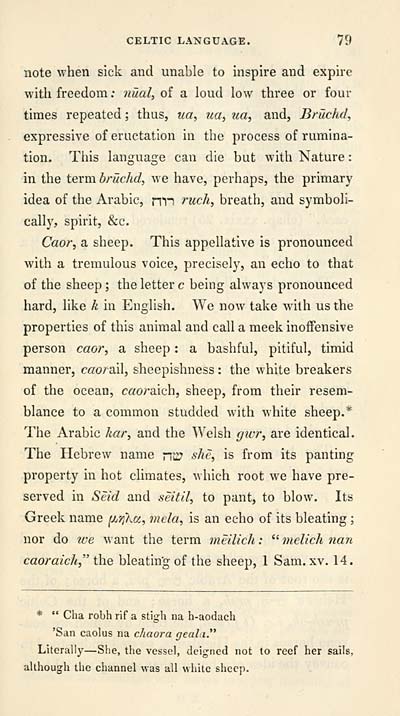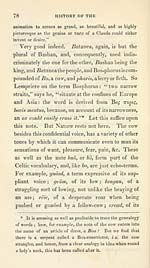Download files
Complete book:
Individual page:
Thumbnail gallery: Grid view | List view

CELTIC LANGUAGE. 79
note when sick and unable to inspire and expire
with freedom ; nualy of a loud low three or four
times repeated ; thus, ua, ua, ua, and, JBruchd,
expressive of eructation in the process of rumina-
tion. This language can die but with Nature :
in the term bruchd, we have, perhaps, the primary
idea of the Arabic, nil nich, breath, and symboli-
cally, spirit, &c.
Caor, a sheep. This appellative is pronounced
with a tremulous voice, precisely, an echo to that
of the sheep ; the letter c being always pronounced
hard, like k in English. We now take whh us the
properties of this animal and call a meek inoffensive
person caor, a sheep : a bashful, pitiful, timid
manner, c«o/ail, sheepishness : the white breakers
of the ocean, c«o;-aich, sheep, from their resem-
blance to a common studded with white sheep.*
The Arabic kar, and the Welsh givr, are identical.
The Hebrew name r\W she, is from its panting
property in hot climates, which root we have pre-
served in Seid and seitil, to pant, to blow. Its
Greek name [jy/jXa, mela, is an echo of its bleating ;
nor do we want the term meilich : " melich nan
caoraich," the bleating of the sheep, 1 Sam. xv. 14.
* " Cha robh rif a stigh na h-aodach
'San caolus na chaora geala"
Literally — She, the vessel, deigned not to reef her sails,
although the channel was all white sliccp.
note when sick and unable to inspire and expire
with freedom ; nualy of a loud low three or four
times repeated ; thus, ua, ua, ua, and, JBruchd,
expressive of eructation in the process of rumina-
tion. This language can die but with Nature :
in the term bruchd, we have, perhaps, the primary
idea of the Arabic, nil nich, breath, and symboli-
cally, spirit, &c.
Caor, a sheep. This appellative is pronounced
with a tremulous voice, precisely, an echo to that
of the sheep ; the letter c being always pronounced
hard, like k in English. We now take whh us the
properties of this animal and call a meek inoffensive
person caor, a sheep : a bashful, pitiful, timid
manner, c«o/ail, sheepishness : the white breakers
of the ocean, c«o;-aich, sheep, from their resem-
blance to a common studded with white sheep.*
The Arabic kar, and the Welsh givr, are identical.
The Hebrew name r\W she, is from its panting
property in hot climates, which root we have pre-
served in Seid and seitil, to pant, to blow. Its
Greek name [jy/jXa, mela, is an echo of its bleating ;
nor do we want the term meilich : " melich nan
caoraich," the bleating of the sheep, 1 Sam. xv. 14.
* " Cha robh rif a stigh na h-aodach
'San caolus na chaora geala"
Literally — She, the vessel, deigned not to reef her sails,
although the channel was all white sliccp.
Set display mode to: Large image | Transcription
Images and transcriptions on this page, including medium image downloads, may be used under the Creative Commons Attribution 4.0 International Licence unless otherwise stated. ![]()
| Early Gaelic Book Collections > Blair Collection > History of the Celtic language > (85) |
|---|
| Permanent URL | https://digital.nls.uk/76179544 |
|---|
| Description | A selection of books from a collection of more than 500 titles, mostly on religious and literary topics. Also includes some material dealing with other Celtic languages and societies. Collection created towards the end of the 19th century by Lady Evelyn Stewart Murray. |
|---|
| Description | Selected items from five 'Special and Named Printed Collections'. Includes books in Gaelic and other Celtic languages, works about the Gaels, their languages, literature, culture and history. |
|---|

